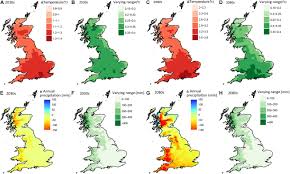The climate crisis is transforming our world, and its effects are notably evident in the United Kingdom, especially concerning the sustainability of wood supply. In this article, we will explore the intricate relationship between climate change and the availability of wood resources in the UK, shedding light on the challenges faced and proposing sustainable solutions.
Introduction:
Climate change is not merely a global phenomenon; its impact is deeply ingrained in local ecosystems. In the UK, rising global temperatures are causing shifts in weather patterns, leading to longer droughts, more frequent storms, and altered precipitation cycles. These changes, in turn, pose significant challenges to the growth and health of forests, directly influencing the availability and sustainability of wood supply.
Climate-Resilient Tree Farming:
One of the key responses to these challenges lies in adapting tree farming practices to be socially and economically responsible. The forestry industry, facing increasing issues due to climate change, necessitates adaptable measures. Sustainable forestry techniques that consider the social and economic facets of tree farming become crucial. As climate change affects the adaptability of traditional tree species, there is a growing need to shift towards more resilient species to ensure the economic activities associated with forestry can be maintained.

Long-Term Availability of Certain Wood Types:
The long-term availability of specific wood types emerges as a critical concern. Climate change can render once-common and commercially viable species less so, disrupting the supply chain for industries dependent on these resources. Take, for example, the uncertainty surrounding the availability of oak, a historically significant timber in the UK. Oak woods are at risk due to pests and diseases that thrive in warmer climates, posing challenges for sectors relying on the unique qualities of oak, such as building and furniture manufacture.
Wood’s Low Carbon Footprint and Sustainable Alternatives:
Despite these challenges, wood remains a sustainable material with a low carbon footprint, offering a green alternative amid climate change woes. Unlike materials requiring substantial energy for production, such as steel, aluminum, concrete, or plastics, wood sequesters carbon during its growth and retains it throughout its life cycle. Wood emerges as a sustainable and environmentally friendly substitute, actively contributing to the battle against global warming.

Should We Be Concerned?
Amidst the challenges posed by climate change on the UK’s wood supply, a pertinent question arises: Should we be concerned? The potential disruption to industries and communities heavily reliant on specific wood types is indeed a cause for concern. However, this concern should serve as a catalyst for change, prompting a reevaluation of practices and the adoption of more sustainable alternatives.

Conclusion:
In conclusion, the changing landscape of the UK’s wood supply due to climate change necessitates a comprehensive and sustainable strategy. By embracing social and economic considerations in tree farming, focusing on the long-term availability of specific wood types, recognizing the unique advantages of wood in combating climate change, and addressing concerns with proactive measures, the UK can navigate the challenges and ensure a sustainable future for its forestry sector.
Image: Insert an image depicting a sustainable and resilient future for UK forestry.
Backlink: Learn more about sustainable forestry practices here.
This blog post is a part of our series on “Sustainable Forestry in the Face of Climate Change.” Stay tuned for more insightful articles on this critical topic.